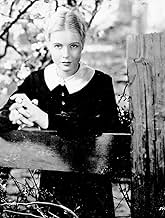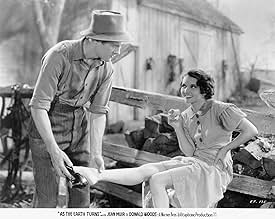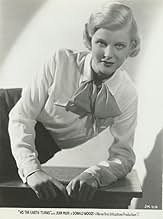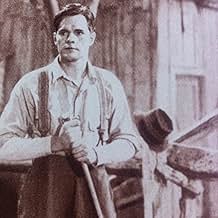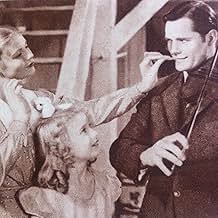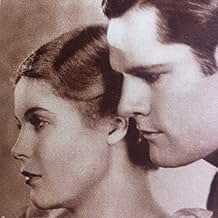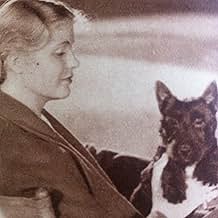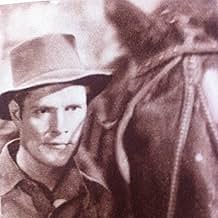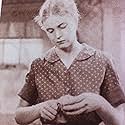Adicionar um enredo no seu idiomaDrama following the lives of an immigrant farm family in Maine.Drama following the lives of an immigrant farm family in Maine.Drama following the lives of an immigrant farm family in Maine.
- Direção
- Roteiristas
- Artistas
Georgie Billings
- Junior
- (as George Billings)
- Direção
- Roteiristas
- Elenco e equipe completos
- Produção, bilheteria e muito mais no IMDbPro
Avaliações em destaque
In rural Maine, the Shaw family has their struggles as they farm the land. There are familial issues abound. Jen Shaw (Jean Muir) takes care of the family while younger sister Doris will do anything to leave for the big city. They are surprised by the arrival of new neighbors, the Polish immigrant family Jankowskis, in the dead of winter. It's a struggle for them. Their musical eldest son Stan (Donald Woods) falls for Jen.
In other times, this would be a family daytime soap like Little House on the Prairie. I don't know if it works as a romantic drama. I do like it when the romance eventually gets somewhere. The most dramatic scene may be shooting the cow. There is also an air of artificiality as the interior stage serves as the fake farm land. It feels like a stage play. The limitations do give this a sense of isolation. This is old-timey and rather plain especially for modern tastes.
In other times, this would be a family daytime soap like Little House on the Prairie. I don't know if it works as a romantic drama. I do like it when the romance eventually gets somewhere. The most dramatic scene may be shooting the cow. There is also an air of artificiality as the interior stage serves as the fake farm land. It feels like a stage play. The limitations do give this a sense of isolation. This is old-timey and rather plain especially for modern tastes.
There is nothing much new in this story of poor farmers in Maine: their trials and tribulations, their hopes and dreams and the Polish family that bought the abandoned farm down the road. However, the performances are excellent. Jean Muir is luminous as the hard-working drudge who wants something more without quite understanding what, William Janney is her brother who is working his way through college and Donald Woods is as good in his miscast role as he can be: he is supposed to be Polish and a violinist, but his faking is as mismatched to the music as can be. Good thing that what he really wants to be is a farmer! But despite the excellence of the acting,it's largely repetitious of characters again and again: the kids are tired of the hard work, the father is understanding, the mother is shrill and grasping and so forth. After a while, it's a little too much.
Fans of star watching should keep a sharp eye out: Shirley Temple is listed on the IMDb as having her last uncredited role in this, the same year she became the biggest star at Fox. Interestingly, I was unable to spot her, nor is she listed in the AFI Catalogue as appearing here. If you do see her here, please let me know where.
Fans of star watching should keep a sharp eye out: Shirley Temple is listed on the IMDb as having her last uncredited role in this, the same year she became the biggest star at Fox. Interestingly, I was unable to spot her, nor is she listed in the AFI Catalogue as appearing here. If you do see her here, please let me know where.
I didn't expect much from this film, but it really intrigued me. So much so that I want to find a copy of the book by the same name, published in 1933, and read the entire story.
The film focuses on three Maine farming families, all interconnected in some way. First there is the newly arrived immigrant Janowski family. They were encouraged to move there by their son, Stan, who gave up a career playing the violin in favor of farming.
Then there is the family headed by Mark and his second wife Cora. For Cora, what's his is hers and what's hers is hers. Part of her attitude is caused by the fact that she and her daughter by her first marriage hate the farming country of Maine and miss the big city.
The third family is headed by Mil and George. Mil openly goes around complaining about how she hates this kind of life and how shiftless George is - and he really is lazy. Mil is always advising any grown girl who will listen to her not to marry a farmer, don't do what she did and get "stuck", go to the city, do something with her life! When George's laziness is the cause of a needed cow dying and he goes to Mark to borrow one of his cows, and this prevents Cora's oldest daughter from going to secretarial school, all hell breaks loose. As one kid says "Who would know one cow breaking its leg could cause so much trouble".
The complicating factor is that Jean Muir as Jen, Mark's daughter but not Cora's, is content with this life, even though it is a hard one. And she and the Janowski's son Stan begin to develop feelings for one another. But Jen does not want to end up like Mil and George, so she insists on more time for making a commitment. She wants Stan to be sure and have no regrets. Stan sees this as rejection. And then there is Cora's oldest daughter, on the prowl for any man that will take her out of this place she considers a frigid hell.
It really is a complex soap opera set in an unusual place. The one thing that does not quite fit in is the solution to their ruts and boredom that the unhappy members of these families think they will find in the city. The book was written about Maine farmers in the 1920's before the crash. By the time this film was released there were no jobs there, and if you owned food producing land you might lead a boring life, but you would eat.
I'd recommend it for any number of reasons, but primarily it was well acted and it was a rare lead part for Jean Muir. She was mainly a supporting player as was the rest of the cast, plus it is a rare look into a world of farm families in a remote place where so many of the individuals were unhappy and restless, when farm life was generally portrayed as happy in most other films of the 1930's and 40's.
The film focuses on three Maine farming families, all interconnected in some way. First there is the newly arrived immigrant Janowski family. They were encouraged to move there by their son, Stan, who gave up a career playing the violin in favor of farming.
Then there is the family headed by Mark and his second wife Cora. For Cora, what's his is hers and what's hers is hers. Part of her attitude is caused by the fact that she and her daughter by her first marriage hate the farming country of Maine and miss the big city.
The third family is headed by Mil and George. Mil openly goes around complaining about how she hates this kind of life and how shiftless George is - and he really is lazy. Mil is always advising any grown girl who will listen to her not to marry a farmer, don't do what she did and get "stuck", go to the city, do something with her life! When George's laziness is the cause of a needed cow dying and he goes to Mark to borrow one of his cows, and this prevents Cora's oldest daughter from going to secretarial school, all hell breaks loose. As one kid says "Who would know one cow breaking its leg could cause so much trouble".
The complicating factor is that Jean Muir as Jen, Mark's daughter but not Cora's, is content with this life, even though it is a hard one. And she and the Janowski's son Stan begin to develop feelings for one another. But Jen does not want to end up like Mil and George, so she insists on more time for making a commitment. She wants Stan to be sure and have no regrets. Stan sees this as rejection. And then there is Cora's oldest daughter, on the prowl for any man that will take her out of this place she considers a frigid hell.
It really is a complex soap opera set in an unusual place. The one thing that does not quite fit in is the solution to their ruts and boredom that the unhappy members of these families think they will find in the city. The book was written about Maine farmers in the 1920's before the crash. By the time this film was released there were no jobs there, and if you owned food producing land you might lead a boring life, but you would eat.
I'd recommend it for any number of reasons, but primarily it was well acted and it was a rare lead part for Jean Muir. She was mainly a supporting player as was the rest of the cast, plus it is a rare look into a world of farm families in a remote place where so many of the individuals were unhappy and restless, when farm life was generally portrayed as happy in most other films of the 1930's and 40's.
The title is a farming joke! This is the story of an immigrant family, trying to make a go of it in Maine. But it never really gets going... we see the ups and downs of farm life. Sons that go off to get educated and may or may not come back to the family home. Barns burning down. Hard work and sadness. This one never picked up steam... just kind of slowly moves along. Right at the very end, finally some emotions and magic. And that's the end. Should have started with that much earlier. Yawn. Directed by Al Green. Low budget thing for Warner Brothers. Green also made Copacabana (Groucho) and Dangerous (B. Davis).
Despite AS THE EARTH TURNS being a pretty dull little film, I am actually glad the studio decided to make it. That's because although the subject matter is tough to make exciting, it's a nice historical portrait of a way of life that has long since disappeared. AS THE EARTH TURNS is the story about some farmers who had extremely hard lives, as they lived in the very inhospitable center of Maine. Filled with snow and very low temperatures, the film did a great job showing just how tough life was for these people as well as how incredibly boring life could be for these farmers--with the nearest "town" many miles away and nothing much to do to keep yourself from going stir-crazy during the long, hard winters.
As for the technical merits of the film, it's decent, though there are absolutely no stars in this Warner Brothers film. This isn't a bad thing, as stars would have distracted from the message. Overall, the beginning of the film was exceptional but the rest of it awfully episodic and tedious. Watchable and mildly interesting to the right audience.
As for the technical merits of the film, it's decent, though there are absolutely no stars in this Warner Brothers film. This isn't a bad thing, as stars would have distracted from the message. Overall, the beginning of the film was exceptional but the rest of it awfully episodic and tedious. Watchable and mildly interesting to the right audience.
Você sabia?
- CuriosidadesThe world's first snow-making machine was invented for the snow scene at the beginning of the movie. The invention, by Warner Bros technical director Louis Geib, consisted of three rotating blades that shaved ice from a 400 pound block, and a high power fan that blew the resulting particles into the air. The invention spurred the development of more sophisticated machines that went on to be used at ski resorts around the world.
- Erros de gravaçãoThe sign on the train station misspells the town of Ogunquit, Maine as "Ogonquit".
- Citações
Stan Janowski: Strange when you think how falling in love spoils people's lives sometimes.
- Cenas durante ou pós-créditosThe credits are presented in a leather book, and a male hand turns each page.
- Trilhas sonorasIn the Shade of the Old Apple Tree
(1905) (uncredited)
Music by Egbert Van Alstyne
Played on the phonograph
Principais escolhas
Faça login para avaliar e ver a lista de recomendações personalizadas
Detalhes
- Tempo de duração1 hora 13 minutos
- Cor
- Mixagem de som
- Proporção
- 1.37 : 1
Contribua para esta página
Sugerir uma alteração ou adicionar conteúdo ausente

Principal brecha
By what name was As the Earth Turns (1934) officially released in India in English?
Responda
